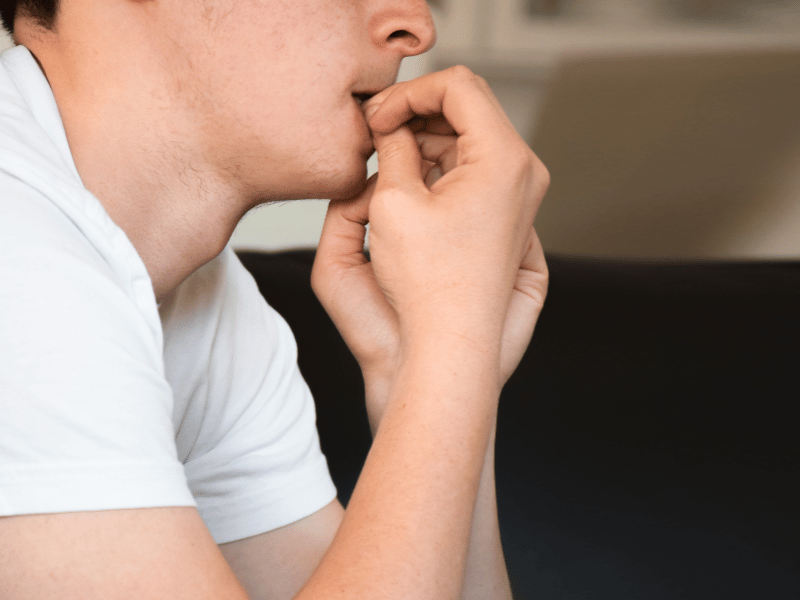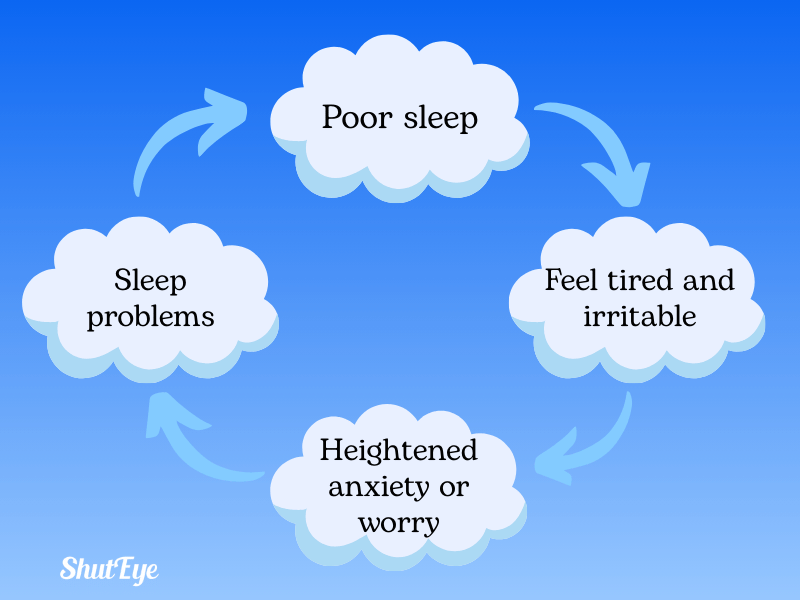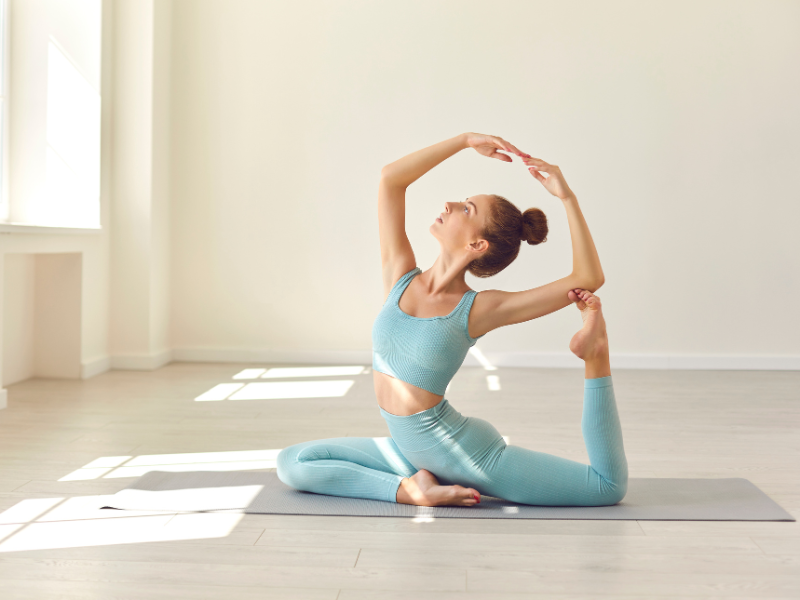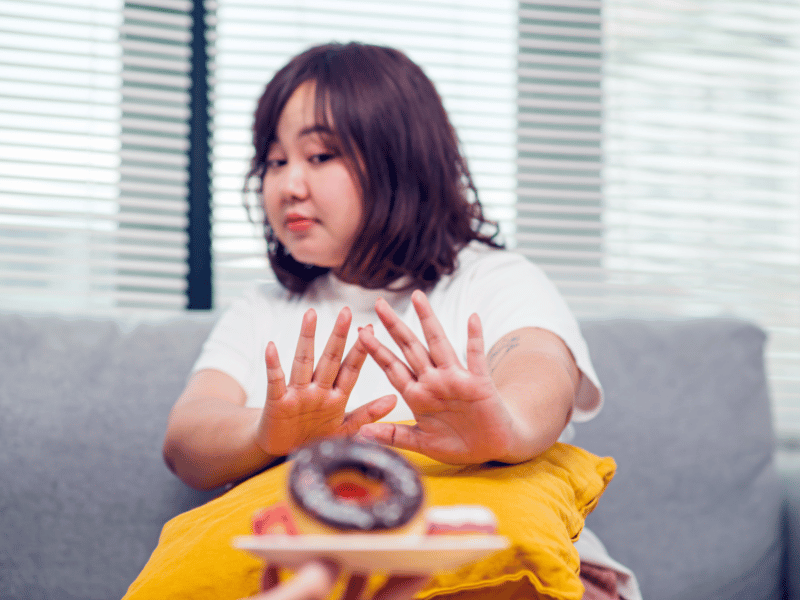


Can you get anxiety from lack of sleep? According to studies, insufficient sleep can lead to symptoms of anxiety and other mental health challenges. They are highly connected as poor sleep may lead to increased stress which causes anxiety. But at the same time, having anxiety disorders can contribute to poor sleep quality. In this article, we’ll explore the deeper connection between lack of sleep and anxiety along with strategies on how to manage anxiety.

According to many studies, not getting enough sleep or poor sleep quality can exacerbate the risk of anxiety disorders [1], [2].
Lack of sleep leads to several problems, including:
Additionally, a study found that chronic sleep loss can affect our ability to regulate emotions which may lead to an increase in anxiety levels [3].

It’s like a cycle where if you don’t get enough good quality sleep, it causes you to feel more tired and irritable and affects your ability to function or cope with daily life. In turn, this contributes to heightened anxiety or worry which makes it harder for you to fall or stay asleep. This is a vicious cycle that may lead to chronic sleep problems and emotional instability.
Conversely, if you are experiencing symptoms of anxiety or have an anxiety disorder, it may lead to difficulty falling asleep. Having anxiety increases feelings of agitation and arousal, making it harder to fall asleep [4].
Indeed, it can. Issues with anxiety and panic attacks are common effects of insufficient sleep.
Difficulty in falling and remaining asleep can result in sleep disturbances. These disturbances can negatively influence your mental well-being. Research suggests that sleep deprivation affects a whopping 50% to 80% of individuals in a typical psychiatric practice [5].
Sleep loss also increases cortisol levels, the stress hormone [6]. This increase may trigger physical symptoms like a quickened heart rate and rapid breathing. In turn, these symptoms can heighten anxiety feelings and contribute to panic attacks.
Sleep anxiety can be a challenging issue. If you’re grappling with it, you might find it tough to both fall asleep and stay asleep.
This isn’t a one-size-fits-all situation — everyone experiences it differently.
Some common symptoms include:
Dealing with these symptoms can be tricky. They can disrupt your everyday life, and not getting enough sleep can make them even worse. This lack of sleep can harm not just your physical health but your mental health, too.h issues.
Restful sleep and a calm mind go hand in hand. However, finding tranquility can sometimes seem like a distant dream. Building more healthy sleep habits can be just what you need to increase the amount of sleep you get. It could help you combat anxiety that occurs as a result of sleep loss.
Here are some strategies to improve sleep and manage anxiety.
Adopting a regular sleep schedule is a crucial step toward achieving better sleep quality and managing anxiety. A haphazard sleep pattern can’t only lead to sleep troubles but can also worsen anxiety.
Here are a few strategies to help you establish a healthy sleep schedule.

Exercise is a critical component of the secret sauce to better sleep and lower anxiety. It’s a simple, effective strategy that can transform your mental health. Let’s break it down.
First off, aim for 30 minutes of physical activity every day.
It might sound like a tall order, but it doesn’t have to be intense. A brisk walk, a light jog, a splash in the pool, or even a yoga session can do the trick. The goal here is to keep moving, get that heart rate up, and keep it consistent.
Why is physical activity so important? The answer lies in what it does to your body. It tires you out, making it easier to fall asleep at night. Physical activity also releases endorphins. These are chemicals in your brain that act like natural mood boosters. They make you feel happier, more positive, and less stressed.
When you feel less stressed, you’re less likely to experience anxiety and panic attacks.
Creating a tranquil sleep environment is essential for quality rest.
A serene bedroom with dimmed lights and cozy bedding sets the stage for relaxation. This, in turn, enhances the quality of your sleep.
The first point on your to-do list should be to curb noise and distractions. A quiet bedroom without electronic devices or bright lights can significantly improve your sleep. If you can’t eliminate noise, consider using earplugs or a white noise machine. These tools will help muffle unwanted sounds.
Our personalized sleep app can also help you relax, offering a wide variety of sleep sounds and stories to help you fall asleep.
It is also best to consider how light impacts your sleep. Daylight can interrupt your sleep cycle. To counter this, use blackout curtains or blinds. These will keep your bedroom dark, creating an ideal environment for sleep.
Lastly, temperature control is key. A cool bedroom fosters a better sleep experience. You can use a fan or adjust your thermostat to achieve the perfect temperature.
If you’re struggling with sleep and anxiety, guided meditation could be your answer. This simple practice can improve sleep quality and help manage your stress.
As mentioned before, anxiety and sleep deprivation are interlinked. They feed off each other, creating a negative cycle. On a physical level, lack of sleep triggers an increase in cortisol levels. This hormone can cause symptoms like a racing heart and rapid breathing. These physical changes contribute further to anxiety.
Guided meditation acts as a powerful tool, helping you to focus on slow, controlled breathing. This process aids in relaxing both your mind and body. Guided meditation also helps to see anxious thoughts for what they are — just thoughts. They’re not your reality. This change in perspective can help to reduce anxiety levels significantly.
A regular bedtime routine can do wonders for your sleep quality. It’s all about tuning in to your body’s internal clock.
A calming pre-sleep routine could involve activities like:
These activities help your body gradually transition into sleep mode.
At the same time, avoid overly stimulating activities before bedtime. Activities such as using electronic devices, watching TV, or engaging in high-energy physical or mental tasks can interfere with your sleep.

Eating right before you hit the hay can disrupt your sleep. It also tends to heighten feelings of anxiety. Here’s why.
The link between sleep deprivation and anxiety is well-documented. Certain habits, like late-night eating, can worsen both.
When you munch on a snack right before bed, your body gets busy. It starts to digest the food when it should be preparing for sleep. This could lead to sleep disturbances.
You might find it hard to fall asleep or stay asleep. This lack of sleep can then fuel anxiety symptoms. You might notice increased irritability and heightened stress levels. The key to managing this is practicing good sleep hygiene.
People with sleep disruption often struggle to determine when it is the right time to seek help.
Anxiety can manifest itself in various ways, including panic attacks, excessive worry, or sleep issues. If these symptoms start to affect your daily life and relationships, it’s time to consider seeking help from a mental health professional.
From there, they will be able to determine the cause of the issue and suggest a suitable treatment for you to cope with your anxiety.
The impact of sleep on our mental and physical well-being is not to be underestimated. It’s the body’s built-in mechanism for daily restoration and recovery. Without proper sleep, we risk compromising our immune system, mood, and cognitive abilities. Thus, making it important to implement good sleep hygiene practices.
If you continue to struggle with poor-quality sleep at night, you may want to consider trying the ShutEye® app. ShutEye monitors your sleep patterns, offering personalized sleep tips to help you gradually improve your sleep quality. Download now for FREE!
Columbia University Department of Psychiatry (2022) How Sleep Deprivation Impacts Mental Health [online]. Available at: https://www.columbiapsychiatry.org/news/how-sleep-deprivation-affects-your-mental-health
Chellappa, S. L., & Aeschbach, D. (2022) Sleep and anxiety: From mechanisms to interventions. Sleep Medicine Reviews, 61, 101583 [online]. Available at: https://doi.org/10.1016/j.smrv.2021.101583
Framework Functional Psychiatry and TMS (n.d.) Sleep and Mood Disorders [online]. Available at: https://www.framework-fp.com/blog-1/sleep-and-mood-disorders
Harvard Division of Sleep Medicine (2021) Sleep and Mood [online]. Available at: https://sleep.hms.harvard.edu/education-training/public-education/sleep-and-health-education-program/sleep-health-education-87
Leproult, R., Copinschi, G., Buxton, O., & Van Cauter, E. (1997) Sleep loss results in an elevation of cortisol levels the next evening. Sleep, 20(10), 865–870 [online]. Available at: https://pubmed.ncbi.nlm.nih.gov/9415946/
Smith, D. (2018) Lack of sleep looks the same as severe anxiety in the brain [online]. Available at: https://www.popsci.com/sleep-deprivation-brain-activity/